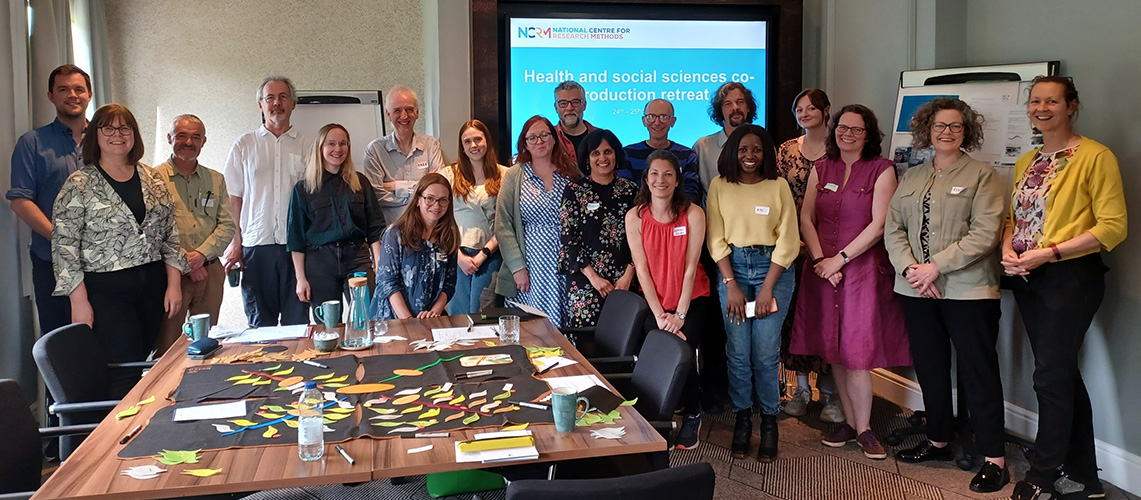 Researchers at a two-day NCRM-led retreat that explored the interface of health and social sciences research
Researchers at a two-day NCRM-led retreat that explored the interface of health and social sciences researchNCRM has been responding to the evolving needs of the social sciences community in the UK for 20 years. With a commitment to enhancing research methods training and capacity building, the centre has established itself as a go-to resource for social science researchers seeking to enhance their methodological expertise.
A significant part of our collaboration with the research community is our engagement work, which enables us to have a rich, ongoing dialogue with researchers, bring together like-minded scholars and support innovation.
A responsive approach
At the heart our engagement work is a responsive approach to the development training needs of researchers. This is exemplified by the commissioning of specialised training, such as our Advanced Methods of Evaluation course, which was tailored by and for researchers in the voluntary, community, faith and social enterprise (VCFSE) sector, and from governments and local authorities.
This course was co-designed with two national charity research managers who helped to create a set of learning outcomes, a commissioning process and a commissioning value.
The aim of this course was to empower mid-to-senior-level researchers with advanced evaluation methods, enhancing their ability to drive impactful research within their respective fields. We were delighted to receive twice as many applications than spaces available, demonstrating a need across the sector.
Another example of NCRM's commitment to working with the research community to understand their training needs is our One Simple Question approach, which was a trial we launched with 14 doctoral training partnerships. During a one-month social media campaign, postgraduate researchers told us which topics they’d like training on, allowing us to identify gaps in the national methods training provision.
As a result, we organised three courses focussed on methodological advancement, for example, The Decolonial Researcher course delivered in June 2024, which was attended by more than 30 researchers. The further two courses, on Bayesian statistics and logistic regression, will be delivered in the 2024-2025 academic year.
Supporting innovation
NCRM's engagement extends beyond influencing commissioned training programmes, with the Innovation Fora scheme playing a crucial role in stimulating methodological innovation.
Through this scheme, we fund researchers to organise collaborative events. These bring together diverse groups of experts to share knowledge and best practices, resulting in tangible outputs such as position papers and the development of new training resources responding to contemporary methodological developments.
Over the past four years, we have supported 11 innovation fora, resulting in videos, papers, a concert, ‘how to’ guides, international networks and keynotes. Topics include investigative methods, machine learning, co-production, practice-based research and freedom of information requests.
Training networks
NCRM's collaboration with the Doctoral Training Partnership Training Network and the Data Resources Training Network underscores our commitment to fostering a supportive community for data services and postgraduate researchers. The networks' activities – including webinars on thematic priorities and methods retreats – provide valuable opportunities for researchers to gain insights into, and shape the future of, critical topics.
Another strand of work that we’re proud of is the formation of methodological special interest groups. These vibrant forums connect people from across the UK who work with related methods, allowing for discussion of new ideas and challenges. What’s more, the groups hold webinars and deliver conference papers – these events are open to the wider research community and enable members to share their insights.
These networks have all been established over the past four years, a period in which we’ve massively stepped up our engagement work. These efforts reflect NCRM’s deep commitment to understanding the social sciences community's needs. By prioritising responsive training programmes, fostering collaborative networks and facilitating methodological innovation, NCRM continues to empower researchers to excel in their commitments to knowledge and societal impact.
Looking to the future
Our engagement work complements other NCRM initiatives, such as our involvement with the Survey Futures project, which aims to deliver a step-change in approaches to survey data collection. Elsewhere, we are reviewing needs for data-driven research skills and, in our Methods Futures project, focusing on important changes that are likely to have a bearing on social research methods and may have greater future impact.
For those new to NCRM, we invite you to explore the wealth of resources and opportunities available to enhance your research methods and join a vibrant community dedicated to methodological excellence. Browse the courses and resources on our website and connect with us on X or LinkedIn to stay informed about our latest initiatives and events.
You can also subscribe to our monthly newsletter. If you have any feedback or suggestions, please email us on info@ncrm.ac.uk

